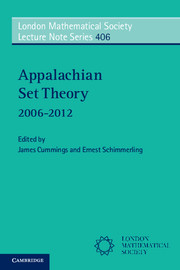Book contents
- Frontmatter
- Contents
- Contributors
- Introduction
- 1 An introduction to ℙmax forcing
- 2 Countable Borel equivalence relations
- 3 Set theory and operator algebras
- 4 A tutorial on Set Mapping Reflection
- 5 An introduction to hyperlinear and sofic groups
- 6 Aronszajn trees and the SCH
- 7 Iterated forcing and the Continuum Hypothesis
- 8 Short extender forcing
- 9 The complexity of classi?cation problems in ergodic theory
- 10 On the strengths and weaknesses of weak squares
- 11 Proper forcing remastered
- 12 Set theory and von Neumann algebras
- 13 The HOD Dichotomy
4 - A tutorial on Set Mapping Reflection
Published online by Cambridge University Press: 05 December 2012
- Frontmatter
- Contents
- Contributors
- Introduction
- 1 An introduction to ℙmax forcing
- 2 Countable Borel equivalence relations
- 3 Set theory and operator algebras
- 4 A tutorial on Set Mapping Reflection
- 5 An introduction to hyperlinear and sofic groups
- 6 Aronszajn trees and the SCH
- 7 Iterated forcing and the Continuum Hypothesis
- 8 Short extender forcing
- 9 The complexity of classi?cation problems in ergodic theory
- 10 On the strengths and weaknesses of weak squares
- 11 Proper forcing remastered
- 12 Set theory and von Neumann algebras
- 13 The HOD Dichotomy
Summary
The sixth Appalachian Set Theory workshop was held at Pennsylvania State University in State College on May 31, 2008. The lecturer was Justin Moore. As a graduate student David Milovich assisted in writing this chapter, which is based on the workshop lectures.
Introduction
The goal of these lectures is to give an exposition of the concept of an open stationary set, an associated reflection principle (for lack of a better word), and a list of examples of how this sort of consideration arises naturally in the context of modern set theory. We will begin with a list of seemingly unrelated questions.
Question 1.1 Does PFA imply there is a well ordering of P(ω1) which is definable over 〈H(ℵ2), ∈〉 (with parameters)?
Question 1.2 Is it consistent that every Aronszajn line contains a Countryman suborder?
Question 1.3 Is it consistent that for all c : [ω1]2 → 2 there exist A, B ∈ [ω1]ω1 such that c is constant on {{α, β} : α, < β ∧ α ∈ A ∧ β ∈ Bg}?
Let us focus on the second question for a moment. Consider the following analogy. Recall that a forcing Q satisfies the countable chain condition (c.c.c.) if every uncountable collection of conditions in Q contains two compatible conditions. Similarly, Q satisfies Knaster's Condition (Property K) if every uncountable collection of conditions contains an uncountable subcollection of pairwise compatible conditions. It is easily verified that the product of a c.c.c. forcing and one with Property K is c.c.c..
Information
- Type
- Chapter
- Information
- Appalachian Set Theory2006–2012, pp. 121 - 144Publisher: Cambridge University PressPrint publication year: 2012
Accessibility standard: Unknown
Why this information is here
This section outlines the accessibility features of this content - including support for screen readers, full keyboard navigation and high-contrast display options. This may not be relevant for you.Accessibility Information
- 1
- Cited by
